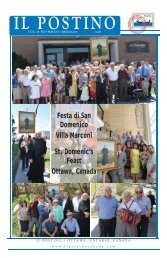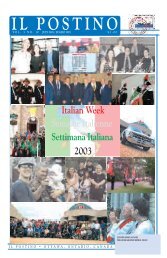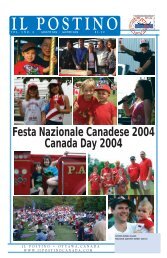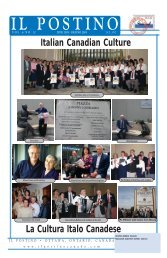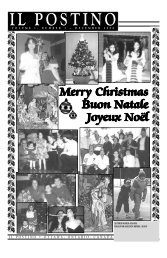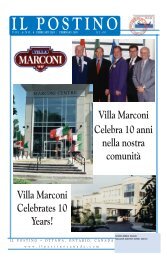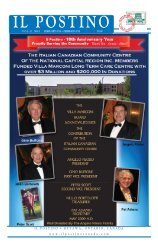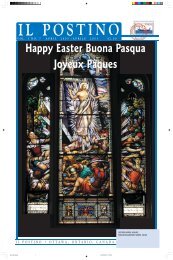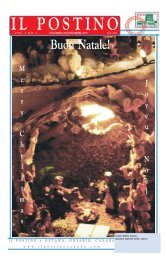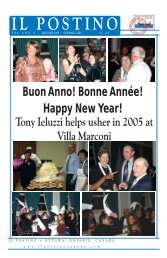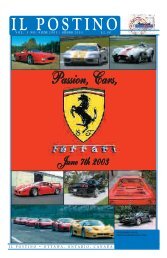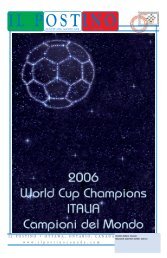June 2002 PDF Vol. 2 No. 9 - Il Postino Canada
June 2002 PDF Vol. 2 No. 9 - Il Postino Canada
June 2002 PDF Vol. 2 No. 9 - Il Postino Canada
- No tags were found...
You also want an ePaper? Increase the reach of your titles
YUMPU automatically turns print PDFs into web optimized ePapers that Google loves.
<strong>June</strong> <strong>2002</strong>I L P O S T I N OPage 5The story of Joe and Tony Ierullo:“Helping people make a connection”by Oliviana MingarelliThe Ierullo family is one of PrestonStreet’s oldest and most loved families.Joe Ierullo was the first member of hisfamily to immigrate to <strong>Canada</strong> fromVallalonga, Calabria in 1928.Upon arriving in <strong>Canada</strong> Joewas sent to work in the minesin Timmins, Ontario. Howeverhe soon found himself joining acrew of workers who wouldhelp in building <strong>Canada</strong>’s railroad.When Joe arrived in Ottawawith his crew he came to an importantdecision: he would quitthe railroad and stay here.Though he remained in constructionfor some time, his decisionallowed him to meet hisfuture wife Vittoria Maviglia.“The story of Joe and Vittoriawas a wonderful love affair,”says his sister-in-law Marie.Joe did not wish to spendhis life within the constructionindustry, therefore with the helpof some good friends he wasable to master the art ofbarbering. In 1936 he bought ahouse on Preston St. and convertedthe front into a barbershop and the back into a homefor his quickly growing family.His first and only son, Tony, wasborn in 1934 and was to be followed by threesisters (Theresa, Rosa and Silvia) all onlyone year apart.“We could always seepeople coming and going”Little did Joe know what an impact hisbarber shop was to have within the Italiancommunity. The barber shop, which remainsone of Ottawa’s oldest businesses,became and still is, a hub for gathering andsharing interesting conversation.“We could always see people comingand going” says his eldest daughter Theresa,“I remember as a child when sitting aroundthe supper table my father would recountmany stories dealing with health, politics,history or whatever else he felt was goodfor us to know. It made me feel proud tosee how knowledgeable he was.”Silvia, the youngest of the family recallsbusy Saturdays and how her mother used tomake zambaglion with cognac and how she,having the least amount of housework,would stay behind the shop door holding theTop: the original barber shop.Right: Proud owner and founder, Joe Ierullo standsbefore his barber shop.food until her father had a minute togulp it down.The existence of a place like thebarber shop was very important to thecommunity. “It was a form of communication”explains Theresa, “Thistook the place of <strong>Il</strong> <strong>Postino</strong>, The OttawaCititzen or CJOH for an earliertime. In the winter people wouldcome by simply to talk, nothing else”she finishes.However, even though business was animportant part of his life, Joe never workedon Sundays and would often bring his familyto Constance Bay where they would enjoyan afternoon of fishing and swimming.The Ierullo house acted on Sundaysmuch as the barber shop did during theweek. “Sundays was a day to receive friendsand family” says Theresa, “My dad alwayshad to have his music, so after our familylunch, he would turn on the music and peoplewould drop by throughout the rest of theday.” Niece to Joe, Angela remembers,“If everyone within the community hadn’t done their littlepart, then this community would not be as strong asit is and that connection wouldn’t have existed!”“There was always lots on the table,my aunt would always have apot of pasta on the stove.” “Wenever feared anything” concludesTheresa fondly.Being a very proud and familycentered man, Joe wished his eldestson Tony to follow in his footstepsand work at the barber shop.Of course his intentions were ofeventually leaving him the business.Though Tony struggled with thisfor a few years (preferring to go into constructionor following his leather-workinghobby), he did eventually agree to pursuethe barbering trade.“Legacy is very important to Italian families”says Silvia, therefore the fact that Tonyfollowed in his father’s footsteps meant theworld to Joe. Joe and Tony became a truefather and son team, both bringing uniquequalities to their trade.Tony grew to love barbery as much orperhaps more than his father. His wife Gailexplains, “people would come in to talkabout anything, sports, children etc. At5:30pm one of his friends used to come inafter work, get his haircut and sit there andchat for hours with Tony. I would have to goto the door and knock to say ‘dinner’s onthe table dear’ but he still wouldn’t leave.He would say ‘just a minute, just a minute’but he couldn’t turn anyone away.”Tony not only loved his job, but the peopleas well. He took pride in his barberyand believed that as an entrepreneur he alsohad a responsibility to the community.Therefore, like his father before him, heattempted to give to the community as muchas it had given him. His father had helpedmany immigrants enter the country and byno means abandoned them when they gothere. He wanted other people to be able tocome to <strong>Canada</strong>, establish themselves andthen be able to send for their families (muchas he had).Joe and Vittoria helped many people findjobs, houses, whatever they needed. Thistradition was passed on to their son Tony.His daughter Gina remembers that hewould sometimes pull out money, withoutany expectation of ever seeing it again, andgive it to a friend or person in need.He knew how hard life could be andwas thankful to have been able to do so wellfor himself. “Joe and Tony helped peoplemake a connection” says Marie, “If everyonewithin the community hadn’t done theirlittle part, then this community would notbe as strong as it is and that connectionwouldn’t have existed!” adds Theresa.The barber shop on Preston St. was aplace where everyone knew your name.People felt like family and this created abond that is stronger than any brick and willtherefore exist forever.Gail says that the family has no intentionof selling the business any time soon.For now, due to Tony’s declining health, hischildren are looking after the business.However, even if one day they do sellthe barber shop, the connections theymade in the community within the walls ofthat barber shop will never fade.The respect this family has earned fortheir prominent role within the Italian communitywill continue from one generationto another.Left: back : daughtersTheresa, Rosa, Silviafront: mother Vittoriaand son TonyMiddle: Tony and hiswife Gail.Right: Tony beganhelping his father at ayoung age.IL POSTINO • OTTAWA, ONTARIO, CANADA




